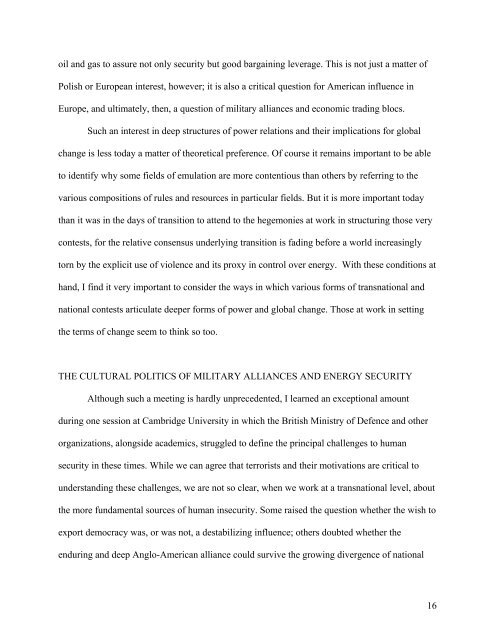from transition to hegemony - The Watson Institute for International ...
from transition to hegemony - The Watson Institute for International ...
from transition to hegemony - The Watson Institute for International ...
Create successful ePaper yourself
Turn your PDF publications into a flip-book with our unique Google optimized e-Paper software.
oil and gas <strong>to</strong> assure not only security but good bargaining leverage. This is not just a matter of<br />
Polish or European interest, however; it is also a critical question <strong>for</strong> American influence in<br />
Europe, and ultimately, then, a question of military alliances and economic trading blocs.<br />
Such an interest in deep structures of power relations and their implications <strong>for</strong> global<br />
change is less <strong>to</strong>day a matter of theoretical preference. Of course it remains important <strong>to</strong> be able<br />
<strong>to</strong> identify why some fields of emulation are more contentious than others by referring <strong>to</strong> the<br />
various compositions of rules and resources in particular fields. But it is more important <strong>to</strong>day<br />
than it was in the days of <strong>transition</strong> <strong>to</strong> attend <strong>to</strong> the hegemonies at work in structuring those very<br />
contests, <strong>for</strong> the relative consensus underlying <strong>transition</strong> is fading be<strong>for</strong>e a world increasingly<br />
<strong>to</strong>rn by the explicit use of violence and its proxy in control over energy. With these conditions at<br />
hand, I find it very important <strong>to</strong> consider the ways in which various <strong>for</strong>ms of transnational and<br />
national contests articulate deeper <strong>for</strong>ms of power and global change. Those at work in setting<br />
the terms of change seem <strong>to</strong> think so <strong>to</strong>o.<br />
THE CULTURAL POLITICS OF MILITARY ALLIANCES AND ENERGY SECURITY<br />
Although such a meeting is hardly unprecedented, I learned an exceptional amount<br />
during one session at Cambridge University in which the British Ministry of Defence and other<br />
organizations, alongside academics, struggled <strong>to</strong> define the principal challenges <strong>to</strong> human<br />
security in these times. While we can agree that terrorists and their motivations are critical <strong>to</strong><br />
understanding these challenges, we are not so clear, when we work at a transnational level, about<br />
the more fundamental sources of human insecurity. Some raised the question whether the wish <strong>to</strong><br />
export democracy was, or was not, a destabilizing influence; others doubted whether the<br />
enduring and deep Anglo-American alliance could survive the growing divergence of national<br />
16
















